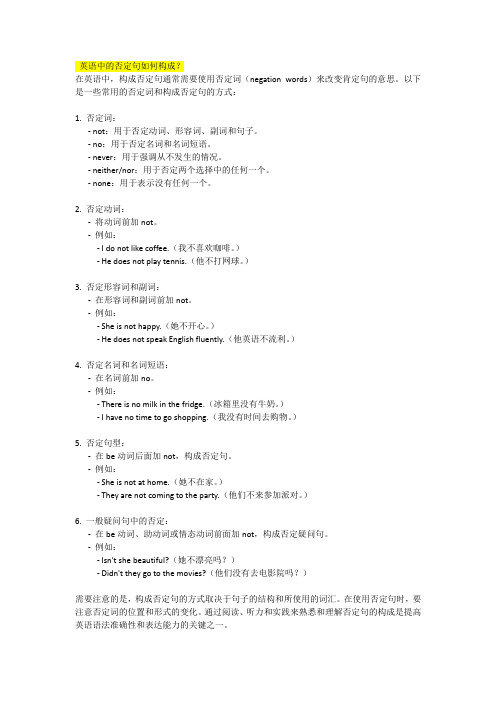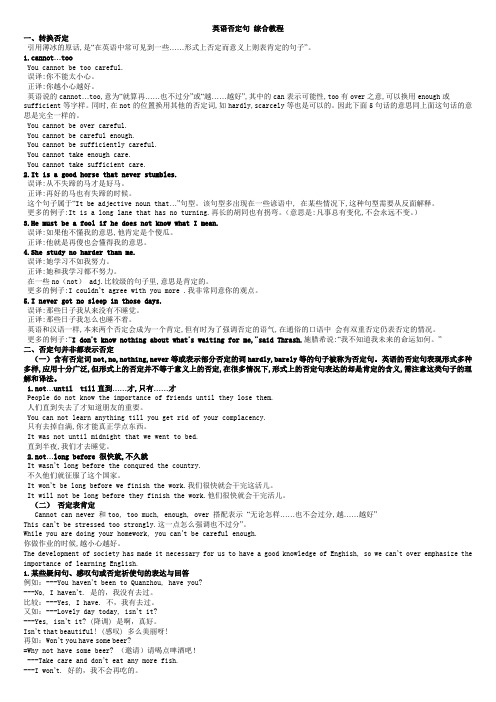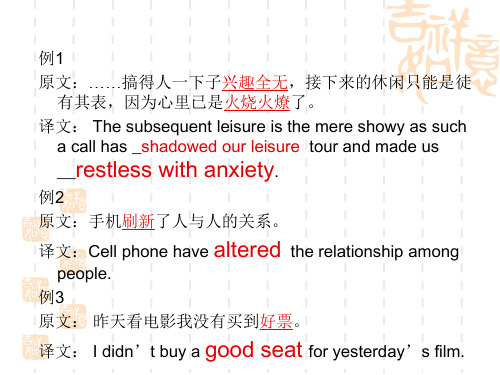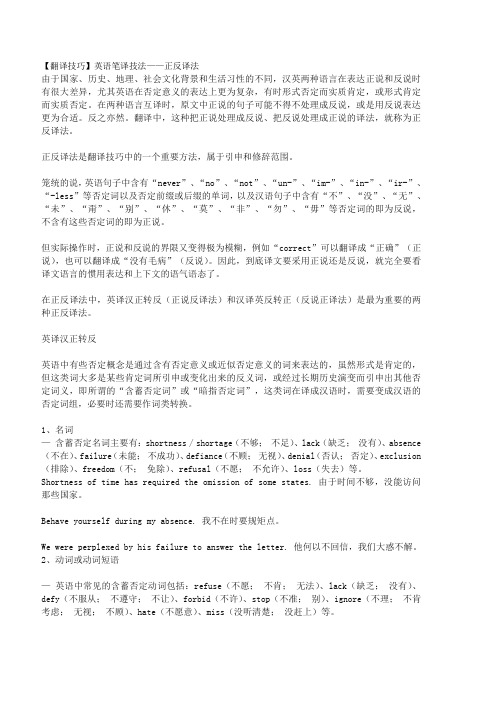-英语中含有肯定意义的否定词短语
英语否定的几种表示方法

英语否定的几种表示方法英语中的部分否定(即不完全否定),接下来,小编给大家准备了英语否定的几种表示方法,欢迎大家参考与借鉴。
英语否定的几种表示方法一、 all 的否定式:not all…(或:all…not)表示"并非都……"、"不是所有的都……"例如:Not all men can be masters. (= All men cannot be masters.) 并非人人都能当头头。
Not all bamboo grows tall. 并非所有的竹子都会长得很高。
二、 both 的否定式:not…both (或:both… not) "并非两个……都……" 例如:I don't want both the books. 我不是两本书都要。
Both (the) windows are not open. 两扇窗子并不都开着。
三、every…的否定式:"不是每……都……" 例如:Not every book is educative. (或:Every book is not educative.) 不是每本书都有教育意义的。
Not everyone likes this book. 并非人人都喜欢这本书。
This flower is not seen everywhere. 这花并不是随处可见的。
四、 always的否定式:"并非总是(并非一直)……" 例如:He is not always so sad. 他并不是一直都这样悲伤。
五、 entirely1, altogether, completely2 和quite 的否定式:"不完全……","并非完全……" 例如:The businessman is never to be entirely trusted. 不可以完全信任商人。
英语中的否定句如何构成

英语中的否定句如何构成?在英语中,构成否定句通常需要使用否定词(negation words)来改变肯定句的意思。
以下是一些常用的否定词和构成否定句的方式:1. 否定词:- not:用于否定动词、形容词、副词和句子。
- no:用于否定名词和名词短语。
- never:用于强调从不发生的情况。
- neither/nor:用于否定两个选择中的任何一个。
- none:用于表示没有任何一个。
2. 否定动词:-将动词前加not。
-例如:- I do not like coffee.(我不喜欢咖啡。
)- He does not play tennis.(他不打网球。
)3. 否定形容词和副词:-在形容词和副词前加not。
-例如:- She is not happy.(她不开心。
)- He does not speak English fluently.(他英语不流利。
)4. 否定名词和名词短语:-在名词前加no。
-例如:- There is no milk in the fridge.(冰箱里没有牛奶。
)- I have no time to go shopping.(我没有时间去购物。
)5. 否定句型:-在be动词后面加not,构成否定句。
-例如:- She is not at home.(她不在家。
)- They are not coming to the party.(他们不来参加派对。
)6. 一般疑问句中的否定:-在be动词、助动词或情态动词前面加not,构成否定疑问句。
-例如:- Isn't she beautiful?(她不漂亮吗?)- Didn't they go to the movies?(他们没有去电影院吗?)需要注意的是,构成否定句的方式取决于句子的结构和所使用的词汇。
在使用否定句时,要注意否定词的位置和形式的变化。
通过阅读、听力和实践来熟悉和理解否定句的构成是提高英语语法准确性和表达能力的关键之一。
英语否定句大全教程

英语否定句综合教程一、转换否定引用薄冰的原话,是“在英语中常可见到一些……形式上否定而意义上则表肯定的句子”。
1.cannot…tooYou cannot be too careful.误译:你不能太小心。
正译:你越小心越好。
英语说的cannot…too,意为“就算再……也不过分”或“越……越好”,其中的can表示可能性,too有over之意,可以换用enough或sufficient等字样。
同时,在not的位置换用其他的否定词,如hardly,scarcely等也是可以的。
因此下面5句话的意思同上面这句话的意思是完全一样的。
You cannot be over careful.You cannot be careful enough.You cannot be sufficiently careful.You cannot take enough care.You cannot take sufficient care.2.It is a good horse that never stumbles.误译:从不失蹄的马才是好马。
正译:再好的马也有失蹄的时候。
这个句子属于“It be adjective noun that…”句型。
该句型多出现在一些谚语中, 在某些情况下,这种句型需要从反面解释。
更多的例子:It is a long lane that has no turning.再长的胡同也有拐弯。
(意思是:凡事总有变化,不会永远不变。
)3.He must be a fool if he does not know what I mean.误译:如果他不懂我的意思,他肯定是个傻瓜。
正译:他就是再傻也会懂得我的意思。
4.She study no harder than me.误译:她学习不如我努力。
正译:她和我学习都不努力。
在一些no(not) adj.比较级的句子里,意思是肯定的。
更多的例子:I couldn‟t agree with you more .我非常同意你的观点。
Translation

词类转换
动词---名词 例1: 原文: 他得出这一结论是深思熟虑的结果。
译文: His arrival at this conclusion was
the result of much deliberate thought. 动词---介词 例1 : 原文: 他支持这个建议,但我反对。
译文: He is for the suggestion, but I am against it.
2 It may be advisable to wait till they come back.
3 It is diligence that makes for deficiency.
确立谓语:
汉语的谓语具有开放性,除了动词之外,名 词、形容词等词类都可以直接充当谓语, 而且可以横排式连用多个动词,而英语的 谓语通常只能由某个动词或系表结构担任, 其他动词往往以非谓语动词的形式出现。
例2: 原文:同学们的精彩表演给校领导留下良好的印象。
译文: The school leaders were __favorably impressed_by the excellent performance of the
students.
词的增补:
1 语法需要:由于汉英两种语言的差异,汉译英时往往需要 补充汉语里省去的词语或没有的词类,以使译文符合英语 语法的要求。增词译法在汉译英中实际上是添加原文为了 语言简洁省去的成分,增补的词多为冠词、代词或名词、 连词和介词等。
译文: A place with water and fish is necessarily blessed with a nice setting, which in return keeps people _in__ good mood.
高中英语:否定形式表示肯定意义的句型总结

【导语】下⾯是⽆忧考整理发布的⾼中英语:否定形式表⽰肯定意义的句型总结,欢迎阅读参考!更多相关讯息请关注⽆忧考!1. nothing but表⽰“只有,只不过”,含肯定意义。
例如:· We could see nothing but water. 我们只看见⼀⼤⽚⽔。
·She does nothing but listen to records. 她除了听唱⽚什么也不做。
2. can / could not...enough意为“⽆论怎么都不够”,表⽰强烈的肯定。
例如:·I cannot thank you enough. 我对你感激不尽。
·You can't be careful enough. 你越⼩⼼越好。
3.can / could not...toocan / could never ...too表⽰“⽆论怎样也不过分”。
例如:·You cannot be too careful when crossing the street. 穿越马路时,再怎么⼩⼼也不为过。
·You can never be too careful in performing an experiment. 做实验越仔细越好。
4. never too...to是对too...to的再否定,表⽰肯定。
例如:· It's never too old to learn. 活到⽼,学到⽼。
It is never too late to give up prejudices. 放弃偏见永远不晚。
5.not … without … 没有……就没有;在这个句型中,使⽤两个否定,⽤来加强语⽓,表⽰肯定意义。
例如:·One cannot live even a few minutes without air. 没有空⽓,⼈们甚⾄连⼏分钟也不能⽣存。
英语特殊句式归纳整理

英语特殊句式归纳整理用来表示说话人强烈的喜、怒、哀、乐等感情的句子,叫感叹句。
感叹句由what或how 引导,具体用法如下表:祈使句的基本用法祈使句是用来表示命令、请求、建议或劝告等的句子。
常省略主语,谓语动词用原形。
1. 肯定的祈使句①句型:动词原形+其他成分。
Be careful!小心!②"Do+祈使句"表示一种强烈的感情或请求,do起强调作用。
③please用在祈使句中可以表示一种客气的语气,但please用在句末时,必须用逗号与其余部分隔开。
Close the door, please. 请关门。
2. 否定的祈使句①常用句型:Don’t+动词原形+其他成分。
Don’t be late for school again! 别再迟到了!②用Never开头:Never+动词原形+其他成分。
Never leave today’s work for tomorrow! 不要把今天的工作留到明天!3. Let引导的祈使句以Let开头的句子也是祈使句,表示陈述和建议。
其否定形式有两种:Let...not或Don’t...Let us not be late. 让我们不要迟到。
Don’t let the boy play football in the street. 不要让这个男孩在街上踢足球。
祈使句与简单句、复合句之间的转换1. "Let’s + 动词原形+ 其他"可转换为"Shall we + 动词原形+ 其他? "。
Let’s go fishing this afternoon. =Shall we go fishing this afternoon?2. "祈使句+ and/or + 简单句"可转换为含if引导的条件状语从句的复合句。
Use your head, and you’ll find a way. =If you use your head, you’ll find a way. Hurry up, or we’ll be late. =If we don’t hurry up, we’ll be late.祈使句的应答语1. 以Let’s开头的祈使句,其答语常用Good idea. /OK. /Yes, I’d love to.等。
英语中形式上肯定、意义上否定的句子的语义特点

fr o o,T o… t 。c o等 .某些肯定的句子 ,可 以通过 上下文 、说 话语 气表 达 出否定 的意义。D .有些 习惯用语及 惯 用法常常 以肯定形 式表 示否定
意义。
关 键 词 :形 式 上 肯定 , 意义 上 否 定 ,肯 定 句 的否 定 意 义 ,词 或短 语 , 固定 结构 , 句式 ,上 下 文 ,语 气 , 习惯 用语 及 惯 用 法 。
英语中有大量句子在形式上是肯定 的,但 意义上 却是否定的 。肯 定句的否定意义是通过词 、词组 、或整个句子表现 出来的。这样的句 子汉语译文常常是否定句 。本文就平时所见 ,对此作一个简要 归纳。
一
( ) S sc )… b t 4 o(uh u:
Hei o u h af oih b yb t e k o sn t c o l o u n wsi. (= T t e d e o o s s h t ha o sn t h kn w
往事 。
I iet ahrh ncfe k arte a of .我喜欢 茶而不喜欢咖啡 。 l e t e I i rte bdta od ts a r a ngo.与其说好 ,不如说坏 。 h h T eudrru dw re a te deta ieu .地 下 工作 者 宁死 h n egon ok r dr hr i hng p h a v
不屈 。
T e u d r o n ok rsi h o l te i ta i p h n eg u dw re a ew udr h r e h ngv u .地 下 工 r d a d e
4 动词 : .
T eeat aehsecp dm .我记不起确切的 日期 了。 h xc dt a sa e e
翻译技巧英语笔译技法——正反译法

【翻译技巧】英语笔译技法——正反译法由于国家、历史、地理、社会文化背景和生活习性的不同,汉英两种语言在表达正说和反说时有很大差异,尤其英语在否定意义的表达上更为复杂,有时形式否定而实质肯定,或形式肯定而实质否定。
在两种语言互译时,原文中正说的句子可能不得不处理成反说,或是用反说表达更为合适。
反之亦然。
翻译中,这种把正说处理成反说、把反说处理成正说的译法,就称为正反译法。
正反译法是翻译技巧中的一个重要方法,属于引申和修辞范围。
笼统的说,英语句子中含有“never”、“no”、“not”、“un-”、“im-”、“in-”、“ir-”、“-less”等否定词以及否定前缀或后缀的单词,以及汉语句子中含有“不”、“没”、“无”、“未”、“甭”、“别”、“休”、“莫”、“非”、“勿”、“毋”等否定词的即为反说,不含有这些否定词的即为正说。
但实际操作时,正说和反说的界限又变得极为模糊,例如“correct”可以翻译成“正确”(正说),也可以翻译成“没有毛病”(反说)。
因此,到底译文要采用正说还是反说,就完全要看译文语言的惯用表达和上下文的语气语态了。
在正反译法中,英译汉正转反(正说反译法)和汉译英反转正(反说正译法)是最为重要的两种正反译法。
英译汉正转反英语中有些否定概念是通过含有否定意义或近似否定意义的词来表达的,虽然形式是肯定的,但这类词大多是某些肯定词所引申或变化出来的反义词,或经过长期历史演变而引申出其他否定词义,即所谓的“含蓄否定词”或“暗指否定词”,这类词在译成汉语时,需要变成汉语的否定词组,必要时还需要作词类转换。
1、名词—含蓄否定名词主要有:shortness / shortage(不够;不足)、lack(缺乏;没有)、absence (不在)、failure(未能;不成功)、defiance(不顾;无视)、denial(否认;否定)、exclusion (排除)、freedom(不;免除)、refusal(不愿;不允许)、loss(失去)等。
- 1、下载文档前请自行甄别文档内容的完整性,平台不提供额外的编辑、内容补充、找答案等附加服务。
- 2、"仅部分预览"的文档,不可在线预览部分如存在完整性等问题,可反馈申请退款(可完整预览的文档不适用该条件!)。
- 3、如文档侵犯您的权益,请联系客服反馈,我们会尽快为您处理(人工客服工作时间:9:00-18:30)。
英语中含有肯定意义的否定词短语
邱凤存
英语中的否定词非常重要,往往是理解句意的关键,也是各种考试的考点。
因此,有关否定词的短语值得英语学习者专门研究和集中学习。
常见的否定词有not,no,none,never,nothing,without 等。
除双重否定表示肯定外,还有一些含有一个否定词的短语也表示肯定含义,现根据他们在句子中的功能和接续归类如下:
1.下列短语在句中作状语,单独使用,不存在接续问题,可置于句首、句中或句尾。
1)as often as not:往往
as often as not the buses are late on foggy days. 每遇多雾天,公共汽车往往脱班。
2)as likely as not :很可能
he is now at home as likely as not. 现在他很可能在家。
3)as soon as not :非常乐意
He would go as soon as not .他很乐意去。
2.下列短语在句中作谓语或与别的动词一起构成谓语,存在接续问题。
1)can not but/can not help but(后跟动词原形):不能不,不由得不
I can not but agree 我不得不同意。
2) have no choice/ alternative but to (后跟动词原形):只好,只有
We have no alternative / choice but to submit。
我只好顺从。
3)can not(后跟动词原形)+ too/over(后跟形容词或副词或前缀over 构成的词,表示“过分”,“太”):越……越……,再……也不会过分
The importance of the course cannot be overestimated。
关于这门课的重要性,再高估都不算过分。
4)could not(后跟动词原形)+形容词或副词的比较级:再……不过了,非常
I couldn’t agree with you more。
我非常同意你的观点。
I couldn’t feel better。
我觉得身体好极了
5)can not help(后跟动词的-ing形式):情不自禁
I can not help laughing 我不禁笑了起来。
3.下列短语在句中作状语,修饰后面的部分,表示程度或强度
1)no more than (后跟名词):仅仅,只是
It’s no more than a beginning 。
这只是个开端。
2)no/ none other than (后跟名词或代词):正式,就是
The new arrival was none other than the president 。
刚来的那位就是董事长。
It is no other than Tom。
这人就是汤姆
注意,“no other …than….”表示除……之外没有别的……”,“只有”,如:I have no other relation than you。
(我除了你之外,就没有别的亲戚了。
)
3)not half (后跟形容词、副词或动词):非常
She didn’t half cry 。
他大声疾呼。
We didn’t half enjoy ourselves。
我们过得十分愉快。
但是,“not half bad”是一个短语,“不错“。
如:Your room is not half bad (你的房间相当好。
)
4)never so (后跟形容词、副词):非常
One hearing the good tidings,she was never so happy。
她一听到这个好消息,就高兴得不得了。
5)nothing but/ none but (后跟名词性短语):只有
It is nothing but a rumour .这完全是个谣言。
None but the aged and the sick stay at home 。
只有老年人和生病的人留在家中。
